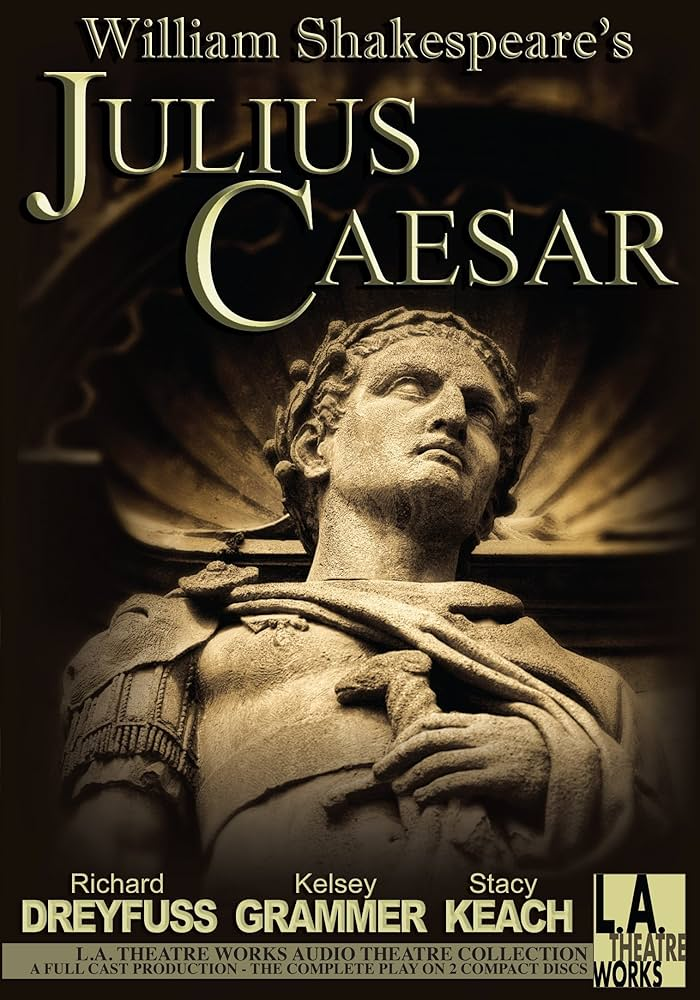Julius Caesar by William Shakespeare
William Shakespeare and His Timeless Legacy
William Shakespeare, often regarded as the greatest playwright in the English language, was born in 1564 in Stratford-upon-Avon, England. His literary genius spans over 39 plays, 154 sonnets, and numerous other works that continue to influence literature, drama, and popular culture. Shakespeare’s ability to explore the complexities of human nature, power, ambition, and morality remains unparalleled. His tragedies, comedies, and histories reflect the intricacies of the human experience, making them relevant across centuries. One of his most famous tragedies, Julius Caesar, delves deep into themes of political ambition, betrayal, and fate, portraying the downfall of one of history’s most iconic leaders.
Julius Caesar: A Political Tragedy of Power and Betrayal
Julius Caesar is a historical tragedy written by William Shakespeare in 1599, based on the life and assassination of the Roman general and dictator Julius Caesar. Set in ancient Rome, the play dramatizes real historical events, exploring political intrigue, the consequences of unchecked ambition, and the fragility of power. Unlike other Shakespearean tragedies where the protagonist meets a tragic end, Julius Caesar presents a complex narrative where the line between hero and villain is blurred, making it a deeply thought-provoking play.
Plot Overview
The play begins with Julius Caesar returning to Rome after a victorious military campaign. His growing power and popularity spark fears among the senators, particularly Cassius and Brutus. Cassius, driven by envy and political ambition, manipulates Brutus into believing that Caesar’s rule threatens the Republic. Despite his inner turmoil, Brutus joins the conspiracy to assassinate Caesar, believing it is for the greater good of Rome.
On the Ides of March, the conspirators kill Caesar in the Senate, leading to one of Shakespeare’s most famous lines, “Et tu, Brute?” Caesar’s death, however, does not restore the Republic. Instead, it plunges Rome into chaos. Mark Antony, a loyal friend of Caesar, turns the Roman public against the conspirators with his stirring funeral speech, leading to a civil war. In the end, Brutus and Cassius meet tragic ends, and the play concludes with the rise of Octavius Caesar, signaling the beginning of imperial Rome.
Themes in Julius Caesar
Power and Corruption
The play explores how political power can lead to corruption and moral dilemmas. While Caesar is portrayed as ambitious, the conspirators, particularly Cassius, are driven by their own lust for power under the guise of protecting the Republic. The struggle between dictatorship and democracy remains a central conflict, resonating with contemporary political discourse.
Fate vs. Free Will
Throughout the play, Shakespeare raises questions about destiny and individual agency. The Soothsayer warns Caesar to “beware the Ides of March,” yet Caesar ignores the warning, leading to his downfall. Brutus, too, grapples with his decisions, believing he is acting out of free will, but ultimately, fate seems to govern their destinies.
Betrayal and Loyalty
The betrayal of Julius Caesar by his closest ally, Brutus, is the emotional core of the play. The phrase “Et tu, Brute?” encapsulates the shock and pain of betrayal. Mark Antony’s unwavering loyalty to Caesar, in contrast, fuels his quest for revenge, demonstrating the power of allegiance in shaping history.
Public Persuasion and Rhetoric
Shakespeare masterfully showcases the power of rhetoric, particularly in Antony’s funeral speech. Antony skillfully sways public opinion against the conspirators, proving that words can be as powerful as weapons in shaping political outcomes.
The Fragility of Democracy
The play serves as a commentary on the fragility of democratic institutions. The assassination of Caesar does not restore democracy; instead, it leads to further chaos and the eventual establishment of an empire, illustrating the unpredictable consequences of political upheaval.
Critical Analysis
Julius Caesar is a play rich in ambiguity, leaving the audience questioning whether Caesar’s assassination was justified. Shakespeare does not present clear heroes or villains, making the play an intricate exploration of human motivations. Brutus, often seen as a tragic hero, is portrayed as noble yet flawed. His idealism blinds him to the political realities of Rome, making him susceptible to manipulation. His downfall is a result of his internal conflict between personal loyalty and public duty.
Cassius, on the other hand, represents a more Machiavellian figure, driven by personal envy rather than genuine concern for the Republic. His ability to manipulate Brutus showcases the dangers of persuasion without moral integrity.
Mark Antony emerges as a master of rhetoric and political strategy. His ability to turn the masses against the conspirators highlights the power of oratory in shaping history. His famous speech, “Friends, Romans, countrymen, lend me your ears,” is a prime example of how carefully crafted words can alter the course of events.
Moreover, Julius Caesar remains relevant in modern times, drawing parallels with political assassinations, power struggles, and the unpredictability of revolutionary movements. It raises important questions about the nature of leadership, the ethical dilemmas of rebellion, and the consequences of political manipulation.
Symbolism in the Play
The Ides of March: A symbol of fate and inevitable doom.
Caesar’s Ghost: Represents guilt, fate, and the lingering consequences of actions.
Blood: Symbolizes betrayal, sacrifice, and the price of political ambition.
Conclusion
Julius Caesar is more than just a historical play—it is a timeless reflection on power, morality, and human ambition. Shakespeare’s exploration of political intrigue, rhetorical mastery, and the complexities of leadership makes the play a profound commentary on governance and the consequences of political actions. The play’s relevance in contemporary times proves Shakespeare’s unmatched ability to capture the essence of human nature and the cyclical patterns of history.
For readers and audiences alike, Julius Caesar serves as a reminder of the intricate balance between power and responsibility, making it one of Shakespeare’s most enduring and thought-provoking tragedies.
References:
Shakespeare, William. Julius Caesar. Maple Press, 2023.





No comments:
Post a Comment